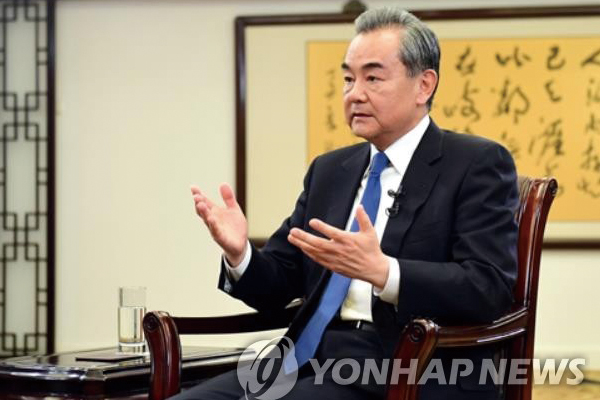In South Korean Foreign Minister Chung Eui-yong’s phone call with Chinese Foreign Minister Wang Yi on June 9, Beijing warned Seoul not to take sides in Sino-U.S. rivalry. The phone conversation between the two came days ahead of the Group of Seven, or G7, summit in Britain this week. At the meeting, Washington is expected to urge its allies and partners to join its campaign to pressure China.
In South Korea, controversy arose as the official statements from the two countries on their latest phone conversation were different. Some South Korean media outlets speculated that the government intentionally left out controversial parts, which could be interpreted as maneuvering to avoid facing an uncomfortable backlash from the international community, the United States, and the South Korean people, whose anti-Chinese sentiment has been growing significantly in recent years.
According to a Chinese Foreign Ministry statement released Thursday, Wang told Chung that Beijing opposes the United States’ Indo-Pacific strategy, describing it as “full of Cold War mentality.” Wang said “The Indo-Pacific strategy proposed by the United States is full of Cold War mentality and stirs up confrontation among different groups, which is not conducive to regional peace, stability and development. China is firmly opposed to it.” He added that “as friendly neighbors and strategic partners, China and the ROK should know well the rights and wrongs, stick to the correct position, abide by political consensus and never be misled.” This part of Wang’s statement was completely left out from the South Korean press release.
This was the first high-level diplomatic conversation between Seoul and Beijing since the summit between U.S. President Joe Biden and South Korean President Moon Jae-in on May 21. Moon and Biden released a statement that mentioned several sensitive issues such as “peace and stability in the Taiwan Strait” and “freedom of navigation and overflight in the South China Sea and beyond.” A day after the summit, a spokesperson from the Chinese Foreign Ministry released a statement that read “We urge the countries concerned to be careful in their words on the Taiwan issue, and not to play with fire.”
The South Korean presidential Blue House and Foreign Ministry repeatedly argued that “the level of opposition from China is low and it appears that they are trying to understand our situation.” Many South Korean observers believe that this is not the case, which Yi’s comments now reveal.
According to the Chinese Foreign Ministry, Chung said that “as a close neighbor of China, the ROK attaches great importance to developing the strategic cooperative partnership with China, adheres to the one-China principle and fully recognizes the sensitivity of cross-Straits relations.” These remarks were also not included in Seoul’s Foreign Ministry statement on the phone call.
The South Korean press release only says that “Foreign Minister Chung hoped that U.S.-China relations would develop in a stable manner, as cooperation between the U.S. and China in responding to global challenges is in the interest of the international community.” The South Korean Foreign Ministry’s press release said that the two “agreed to continue communication to realize President Xi Jinping’s visit to Korea in the near future as soon as the Covid-19 situation is stabilized and conditions are created.” This was not mentioned in the Chinese press release. These selective inclusions indicate that the two countries have different points that they want to emphasize.
Experts in South Korea argue that this is a rare instance of China showing harsh opposition to the United States and asking for South Korea to take a neutral stance during a high-level conversation. Some also said that this is in fact interference with domestic affairs.
As the controversy grew, an official from the South Korean Foreign Ministry met with reporters to provide further explanations on the conversation. The official said that the phone call came at the request of Chung and that it had a “frank atmosphere,” rather than a threatening one, which was how it was described in some domestic reports. The official added that despite some media reports indicating that China tried to specifically ask South Korea to take a certain stance regarding the United States, Yi just repeated Beijing’s previous stance. According to the official, “It was not like specifically pointing out to our country and saying ‘you do this.’”
On the same day, Chinese Ambassador to Seoul Xing Haiming echoed a similar message in a radio interview with South Korean media outlet CBS Thursday, describing the U.S. Indo-Pacific Strategy as a policy to contain China and noting that the United States is stuck in a Cold War mindset. He added that he hopes Korea “takes into more consideration China’s position on the Taiwan and South China Sea issues.” Xing also said that “it would be good if we are not affected” by the U.S.-China rivalry.
Meanwhile, Chung and Wang also discussed ways to work toward improving inter-Korean relations. The South Korean Foreign Ministry said Chung and Wang “reaffirmed the common goals of realizing denuclearization and establishing permanent peace on the Korean Peninsula and discussed ways to cooperate to this end.” According to the Chinese Foreign Ministry, “Wang Yi called on the United Nations Security Council to invoke the reversible provisions in the Democratic People’s Republic of Korea (DPRK)-related resolutions and ease sanctions against the people’s livelihood in the DPRK.” Wang also urged the United States to take practical actions to realize the joint statement signed by North Korean leader Kim Jong-un and former U.S. President Donald Trump.



